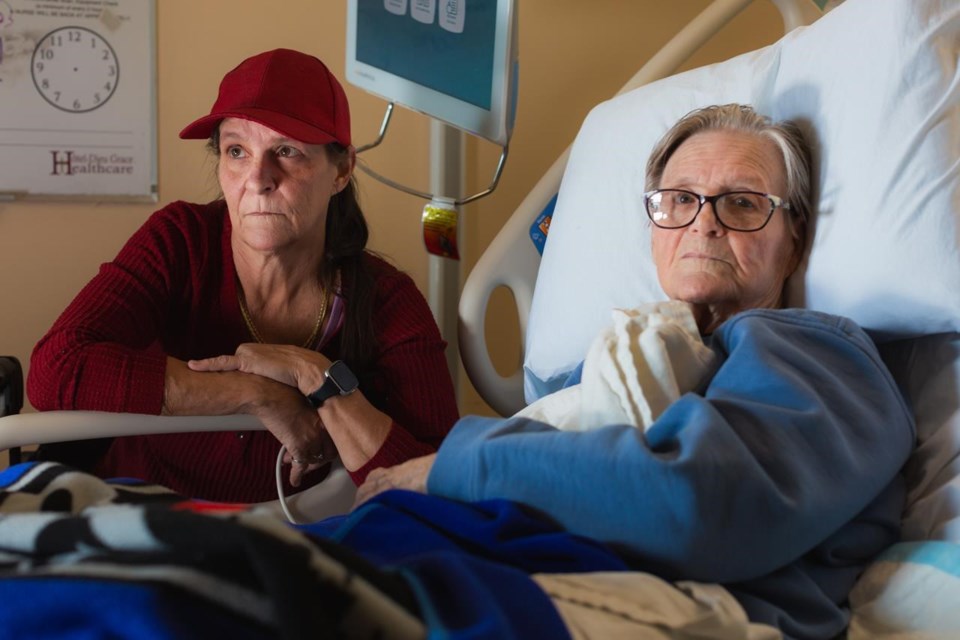A southwestern Ontario woman has received an $8,400 bill from a hospital in Windsor, Ont., after she refused to put her mother in a nursing home she hated – and she says she has no intention of paying it.Â
Michele Campeau and her 83-year-old mother, Ruth Poupard, are caught up in a relatively new law that allows hospitals to place discharged patients into nursing homes not of their choosing in order to free up beds. If patients refuse to move, they face a fine of $400 per day as they remain at the hospital.Â
The bill came from Hôtel-Dieu Grace Healthcare, where Campeau's mother remains, with instructions to pay at the cashier's office or by phone or online. The hospital charged the family for 21 days in March.Â
"I'm never paying it because the law is wrong," Campeau said. "It's unfair what they're trying to do to seniors."
Campeau is expecting an even bigger bill to land in the coming weeks to account for all the daily fines that have racked up for April.Â
"We're expecting another bill for $12,000 soon," she said.Â
On Thursday afternoon, Campeau found out her mom was accepted into the nursing home that was her top choice. She is set to move next week.
"Then we'll get another bill for $6,000 for May," she said.Â
The law that allows hospitals to issue such fines – known as the More Beds, Better Care Act, or Bill 7 – was passed by the Doug Ford government in the fall of 2022 in an effort to open up much-needed hospital space.Â
It is aimed at so-called alternate level of care patients who are discharged from hospital, but need a long-term care bed and don't have one yet.
Hospitals can send patients to nursing homes not of their choosing up to 70 kilometres away, or up to 150 kilometres away in northern Ontario, if spaces open up there first.
Hôtel-Dieu Grace Healthcare said it cannot comment on Poupard's case due to patient confidentiality.
The last few years have been tough for Poupard. Dementia set in, she underwent a heart valve transplant and survived cancer. She moved in with her daughter, who took care of her and became her power of attorney.Â
Poupard's most recent health-care journey began shortly after Christmas when she hallucinated during the night, fell and broke her hip. Campeau rushed her to hospital, where she had surgery. As part of her recovery, Poupard moved to Hôtel-Dieu Grace Healthcare for rehabilitation.
By Feb. 21, Poupard recovered to a point where her physician determined she no longer needed the hospital's specialized care and discharged her.
Campeau and her brother decided that they alone would not be able to manage their mother's needs if she returned to live in her daughter's home.Â
So the family worked with a placement co-ordinator at the hospital and put five long-term care homes on Poupard's list. But those were full. Discussions about adding more nursing homes to Poupard's list then began, under the provisions of the new law.
Campeau agreed to put more nursing homes on her mother's list and the co-ordinator added homes until one that had a spot available came up. Campeau then had 24 hours to visit the nursing home and make a decision.Â
If she refused to move her mom into that long-term care home in downtown Windsor, the hospital said they'd begin charging her $400 a day. Campeau said she visited the home and found it "disgusting," refusing to place her mother there.
Several weeks later, the first bill landed.Â
The hospital also charged Poupard a co-pay rate – the rate she would pay in a long-term care home – of $653.20 for 10 days in March before she refused the move into that one nursing home.
"I paid it like I did the one in February, which I'm more than happy to do," Campeau said of the co-pay. "But I'm not paying $400 a day because I didn't go along with their plan to put her in a disgusting home."
The province said it believes only seven people have been fined under the law and that hospitals are responsible for the administration of fines. Health Minister Sylvia Jones said the government cannot disclose how much those patients were charged due to patient confidentiality.
Liberal parliamentary leader John Fraser said he supports Poupard and Campeau's refusal to pay the bill.
"It's the right thing to do," he said. "I think that the minister should intervene and try to find a solution."
The family also has the support of the NDP.
"This is a tragedy," said NDP Leader Marit Stiles.
Stiles said she is also worried about all the patients who have already been moved to nursing homes not of their choosing.Â
"I'm hearing increasingly about vulnerable people having to leave their communities to go far away to find long-term care beds," she said. "It's sad."
Some 300 patients have been moved into new homes not of their choosing.
Campeau is now in limbo, unclear on what will happen with her unpaid bill.
"I have no idea what happens next," she said. "I really just want my mom in a decent spot, that's all."
This report by The Canadian Press was first published May 9, 2024.Â
Liam Casey, The Canadian Press



